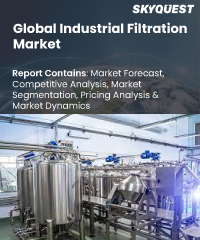
Product ID: SQMIG20I2154

Report ID:
SQMIG20I2154 |
Region:
Global |
Published Date: February, 2024
Pages:
165
|
Tables:
97 |
Figures:
76
Industrial Filtration Market size was valued at USD 20.5 billion in 2019 and is poised to grow from USD 23.2 billion in 2023 to USD 36 billion by 2031, growing at a CAGR of 6.49% in the forecast period (2024-2031).
The market is influenced by a number of significant factors, such as government-enacted environmental regulations and policies, the need for safe working environments in industrial facilities, the rising demand for equipment dependability and equipment lifespan extension, and the growth of industry in developing nations.
The need for safe working environments in industrial facilities, rising urbanisation and industrialization across the globe, particularly in Asia-Pacific, stringent government policies that aim to eliminate or limit airborne pollutant concentrations in order to protect human health, and rising consumer demand for high-quality products are all driving the growth of the global industrial filtration market.
The market is largely driven by the water and wastewater treatment industry. The sector uses a number of procedures, including sewage treatment, water recycling, effluent treatment, and water treatment. Technology used in the sector also includes testing, disinfection, and distillation. The need for industrial filtering, which is necessary to remove pipe scale, algae, sand, and slit from the primary water source, is anticipated to increase as a result.
US Industrial Filtration Market is poised to grow at a sustainable CAGR for the next forecast year.
Our industry expert will work with you to provide you with customized data in a short amount of time.
REQUEST FREE CUSTOMIZATIONIndustrial Filtration Market size was valued at USD 20.5 billion in 2019 and is poised to grow from USD 23.2 billion in 2023 to USD 36 billion by 2031, growing at a CAGR of 6.49% in the forecast period (2024-2031).
Want to customize this report? This report can be personalized according to your needs. Our analysts and industry experts will work directly with you to understand your requirements and provide you with customized data in a short amount of time. We offer $1000 worth of FREE customization at the time of purchase.

Product ID: SQMIG20I2154